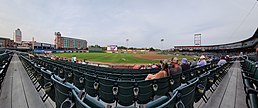Manchester, New Hampshire | |
|---|---|
The skyline of Manchester District C Mill Housing | |
| Nickname(s): Queen City, Manch Vegas[1] | |
| Motto: Labor Vincit (work conquers) | |
 Location in Hillsborough County, New Hampshire | |
| Coordinates: 42°59′27″N 71°27′49″W / 42.99083°N 71.46361°W | |
| Country | United States |
| State | New Hampshire |
| County | Hillsborough |
| Incorporated (as Derryfield) | 1751 |
| Incorporated (as Manchester) | 1846 |
| Named for | Manchester, England |
| Government | |
| • Mayor | Jay Ruais |
| • Aldermen | Members
|
| Area | |
| • City | 34.94 sq mi (90.48 km2) |
| • Land | 33.07 sq mi (85.65 km2) |
| • Water | 1.87 sq mi (4.84 km2) 5.33% |
| • Urban | 86.1 sq mi (223.1 km2) |
| Elevation | 210 ft (60 m) |
| Population (2020) | |
| • City | 115,644 |
| • Rank | US: 256th |
| • Density | 3,497.05/sq mi (1,350.23/km2) |
| • Urban | 158,377 (US: 209th) |
| • Urban density | 1,838/sq mi (709.8/km2) |
| • Metro | 422,937 (US: 128th) |
| Time zone | UTC−5 (Eastern) |
| • Summer (DST) | UTC−4 (Eastern) |
| ZIP Codes | 03101–03105, 03108-03109, 03111 |
| Area code | 603 |
| FIPS code | 33-45140 |
| GNIS feature ID | 868243 |
| Website | www |
Manchester is the most populous city in the U.S. state of New Hampshire and the tenth most populous in New England. As of the 2020 census, it had a population of 115,644.[3]
Manchester is, along with the city of Nashua, one of two seats of New Hampshire's most populous county, Hillsborough County. Manchester lies near the northern end of the Northeast megalopolis and straddles the banks of the Merrimack River. It was first named by the merchant and inventor Samuel Blodget(t), eponym of Samuel Blodget Park and Blodget Street in the city's North End. His vision was to create a great industrial center similar to that of the original Manchester in England, which was the world's first industrialized city.[4]
During the Industrial Revolution, Manchester was a major industrial and economic hub for New England, with the Amoskeag Manufacturing Company being the largest cotton textile plant in the world.[5] After World War II, many textile manufacturing jobs left Manchester, but new industries and companies were introduced to the city, such as DEKA.
- ^ Cite error: The named reference
ManchVegaswas invoked but never defined (see the help page). - ^ "ArcGIS REST Services Directory". United States Census Bureau. Retrieved September 20, 2022.
- ^ "Manchester city, Hillsborough County, New Hampshire: 2020 DEC Redistricting Data (PL 94-171)". U.S. Census Bureau. Retrieved December 1, 2021.
- ^ Manchester, New Hampshire Publisher: CityTownInfo.com Retrieved: March 4, 2014.
- ^ Shields, Keith (May 23, 2012). "New Hampshire's Immigration Story - Come to Amoskeag!". NH Public Radio. Retrieved August 19, 2020.










